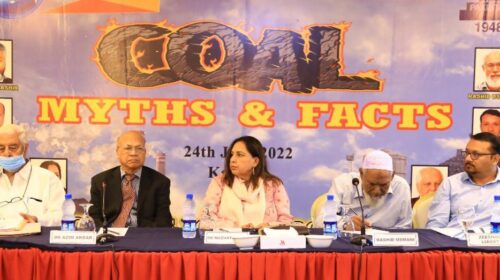It is high time that Pakistan should adopt a safe and balanced approach to exploit its vast coal reserve for power generation with the least damage to the environment to overcome energy shortfall without further burdening the economy.
This was one of the main recommendations of a seminar on “Coal energy: myths and facts” organised by the Citizens for Environment in collaboration with the Institution of Engineers Pakistan (IEP).
The speakers of the seminar noted that Pakistan’s reliance on coal for electricity production had been much less than the global average for the same so this indigenous energy source should extensively be used to protect precious foreign exchange reserves that are otherwise constantly being spent to import expensive fossil fuels.
They highlighted that owing to global energy insecurity caused due to continuing war between Russia and Ukraine many European nations had been compelled to revive their decades-old coal-based electricity plants to avoid energy shortages for their countrymen.
Engineer Sohail Basheer, IEP Chairman, said that indigenous coal reserves had been proven the cheapest energy source the world over after hydroelectricity.
He said the coal reserves in Thar could go a long way to make Pakistan an energy surplus country with least reliance on imported fuel for power production.
Dr Azim Akbar, an energy expert, said that Pakistan had one of the world’s largest reserves of lignite coal that is largely untapped.
He said that in addition to power production the coal reserves in the country could easily be converted into liquid fuels and gas that is useful for a number of industries.
Dr Nuzhat Khan, former director-general of the National Institute of Oceanography, said that all over the world 40 per cent of electricity production was coal-based while Pakistan’s reliance on coal for the same had been much less.
She said that all the relevant academic and research institutions should join hands to do collaborative work to accurately determine Pakistan’s coal footprint.
She said the exact determination of the national coal footprint would be helpful to adopt a safe strategy for exploiting indigenous coal reserves for power generation.
She said that Pakistan should adopt the latest clean technologies for coal-based power generation.
Rashid Usmani, an environmental consultant, suggested forming a committee comprising of all the relevant experts for adopting an effective national strategy for consuming indigenous coal reserves of the country for power generation with maximum safeguards for the environment.
Zeeshan Liaquat of Pakistan International Bulk Terminal said the PIBT at the Port Qasim had the adequate capacity and full commitment to export Pakistan’s lignite coal reserves for earning foreign exchange.
Faisal Iqbal Siddiqui, General Manager Technical, Sindh Engro Coal Mining Company (SECMC), spoke about the vast potential of Thar Coal, and how SECMC has been able to exploit this vast natural energy source, and at the same time mitigate the environmental effects associated with coal-usage.
He also debunked the myth associated with the low quality of coal available at Thar reserves, and said the lignite available in Pakistan, and especially in Thar, is as good as anywhere in the world. Thar has the potential to solve the energy crises of Pakistan for ages to come.
A Question-Answer session was later held, where the audience debated and argued on various aspects of coal usage, handling and transportation, especially those occurring in the immediate vicinity of human habitat.
One question was raised regarding the underground gasification of coal, and what potential it has to solve the energy crises. It was stated that in the presence of tried and tested power generation through coal- power plants, under-ground gasification is a tricky method, which still needs more development to be able to match the power generation capacity of coal power-plants.
Another member of the audience raised a very pertinent question, that a few years back the Supreme Court stopped coal activity at KPT declaring it as injurious to human health and being in close proximity to human habitat. However, KPT is still importing Petcoke, whose physical properties are very near to that of coal dust, and equally injurious to human health. Is the handling of Petcoke at KPT, a precursor to KPT restarting Coal handling at their terminal. Rashid Usmani, the environment consultant, who had done an EIA report for the coal- handling at KPT, responded by saying that KPT is following the SC ruling in toto.
In response to another question regarding the quantity and availability of water used for sprinkling as a precursor to coal-dust suppression, Zeeshan Liaqat of PIBT informed the audience that the water is being supplied by Port Qasim Authority as per their commitment.
Engineer Nooruddin Ahmed, Chairman of Citizens for Environment, said that his non-governmental organisation would organise more such seminars to highlight other major challenges to the environment in the country.
Need stressed for balanced approach for safely consuming Pakistan’s vast coal reserves with least harm to environment





